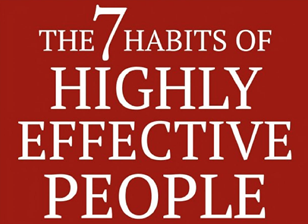
The key to success in any job is leveraging the team's skills and working with others to achieve business results that exceed expectations and achieve business success.
I have done this through a servant leader mentality that can be used to achieve your goals and objectives as well.
In engineering, and in many areas of life, people want to focus on tools and methods. But Principal Centered Leadership can take you farther and faster than any tool can possibly do. I'd like to show you how Principal Centered Leadership and Covey's Seven Habits of Highly Successful People come together to provide everyday habits that engineers can use to improve their results on the shop floor.
Beginning with tools and methods; tools and methods are great. What many people ask, are what are the most important tools an engineer can learn and use? They are usually looking for a few tools, usually a very small set of 1 or 2 tools. But they are asking the wrong question. Tools and methods can only take you so far. Now, tools and methods are important, but they are always in flux. Throughout the years, tools change, the use changes, and with the speed of hardware and software, becoming too focused on current tools can divert you from a more effective path.
Additionally, each application requires the right tool. So not only does focusing on tools cause you to put on blinders but can also lead you to use a familiar tool for the wrong task. These are the wrong questions.

Let’s focus on the right thing.
Tools and Methods are great. But, they will only take you so far, and if misused……….
The right thing is Principal Centered Leadership. Principal Centered Leadership is the framework to hang all of your tools and methods in. It will get you a lot farther and a lot faster than any tool or method. This method is using these time-worn and time-proven fundamental truths that drive what you do and how you will act, and how you will impact others, which is key.
More important than tools and methods are a set of principles that drive:
So what we want is a set of principles that drive our behaviors and make sure we are doing the right things at the right time, the right place, to reach the right goals. With that, we can make huge strides and impact the business.
Isaac Newton said that if I had been able to see further it was only because I stood on the shoulders of giants.
Not to compare too closely to Isaac Newton, but I have stood on the shoulders of many leaders and great people. One leader, in particular, sent me to a class that really helped me while I was handling a lot of life struggles; a new toddler, a big move to a new city, and a new job role. This class really changed my life.
That class was the Seven Habits of Highly Effective People.
Written in 1989, this work contained seven habits to promote effective behavior and was added to in 2004 with an 8th habit. Many leaders I met over the years took this same class and it shaped them as well. Thinking of my life and work, this was one of the most fundamental impacts and drove the creation of these 8 habits for engineers.
These time-worn principles can guide your work on a day-to-day basis. A great book that I highly recommend.
Steven Covey 1989 
Plus
8. Find Your Voice and Inspire Others to Find Theirs 
These are the 7 habits of the highly effective engineer. Each of Covey’s has been translated to drive great behavior in the engineering world:
“I’ve missed more than 9,000 shots in my career. I’ve lost almost 300 games. Twenty-six times, I’ve been trusted to take the game-winning shot and missed. I’ve failed over and over and over again in my life. And that is why I succeed.”
Michael Jordan
This is one of my favorite quotes from Michael Jordan, the all-time great basketball player. Some great battles between the Bulls and our local Pistons. You had to respect the man’s work ethic and skill. His ability to fail over and over again without becoming discouraged, and leverage those failures to succeed leads us right into our first highly effective habit.
Download the eBook below to get all 8 habits in one pdf
These Stories on T&T
No Comments Yet
Let us know what you think